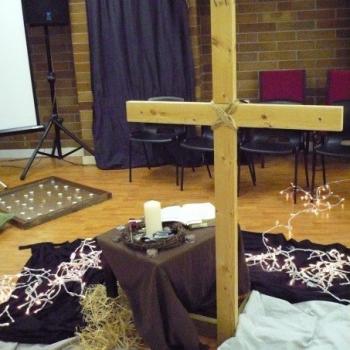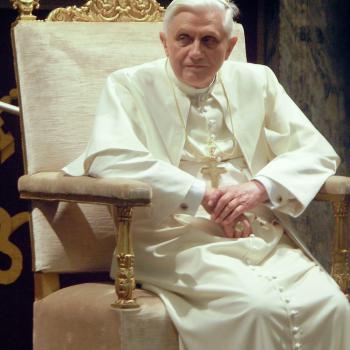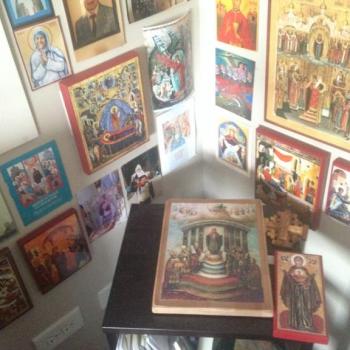We are re-launching Religion Ethnicity Wired again today. That’s right: the same day that the pope is abdicating.
It’s a perfect day to re-launch the conversation on religion and ethnicity. I trust folks like Fr. Robert Barron and Fr. Jim Martin, SJ, to give astute comments on the abdication on live television, not to mention the flurry of reflective activity in Catholic periodicals. Check out Our Sunday Visitor, America Magazine, Commonweal Magazine, and The Tablet for details.
What I find remarkable, though, is that recently, we have had not one, but two, religious leaders step down. Both were academics.
In his prior life, Pope Benedict XVI was Professor Joseph Ratzinger at the University of Tübingen. The other one, Rowan Williams, stepped down at the end of 2012 from his post as Archbishop of Canterbury. Both of them, citing their weariness from the posts, commented on their welcome return to a life of study and contemplation. Rowan Williams has gone to Cambridge. Pope Emeritus Benedict XVI will live in a re-modeled convent with his secretary, his cats, his piano, and his books.
Even as academia itself has been squeezed over the last decade by market re-structuring, we’ve had not one, but two, religious leaders who were specialists in not only theology, but the humanities. In fact, they, like academia, were squeezed too, criticized for being too academic, more interested in keeping the conversation going than enforcing strong leadership.
Take, for example, the conversation on Islam. Both the pope and the archbishop got flack for stuff they said on Muslims. Pope Benedict got protested when he quoted from an anti-Islamic text in a lecture he gave on faith, reason, and the university at the University of Regensburg. He was trying to start a conversation on Christianity and Western thought. Bad as the reaction was, though, the conversation did eventually get somewhere: A Common Word Between Us and You, a response on the part of Muslim leaders across the theological spectrum to Christians across their theological spectrum on what Christians and Muslims actually had in common. For his part, Rowan Williams then got criticized for saying that he could see shari’a law implemented in the United Kingdom. You could say that for both Benedict XVI and Rowan Williams, the Islamic thing was a non-starter because nobody wanted to hear what they had to say to keep the conversation going. People were interested on their position on Muslims, period.
Take also sexuality. Benedict XVI is (in)famous for a 1986 letter he penned that regarded homosexual orientation as “intrinsically disordered,” a point he reiterated in 2003, and most recently, in last year’s Christmas address to the Roman curia. Meanwhile, he’s been dogged by a sex abuse crisis throughout the worldwide Catholic Church–though he has embraced a policy of zero tolerance for clergy sexual abuse–and in the wake of his resignation, there have been rumours of a “gay lobby” in the Vatican. In fact, Andrew Sullivan goes as far to suggest that the pope and his secretary might have a thing together. On the other hand, Rowan Williams toyed with the idea of alternative sexualities as a gift of grace in the 1980s, only to oppose same-sex marriage as Archbishop of Canterbury. Yet he has been trolled by both conservatives and progressives alike in the Anglican Communion for his centrist stances on sexuality. What’s important to note, though, are that terms like “intrinsically disordered” and the “body’s grace” attempt to bring the conversation to the heart of human existence, whether one agrees with them or not. Moreover, both Benedict XVI and Rowan Williams attempted to do what St. Ignatius of Loyola called “thinking with the Church” (a point that Ratzinger had stressed in his Introduction to Christianity), to be informed by what the Windsor Report called the “mind of the communion,” to listen closely to the Christian conversation about sexuality instead of making unilateral decisions from the top. But listening reflection is slow, and both have been criticized by progressives and conservatives in their respective communions for their slowness to act.
Let’s also look at what conversations both were willing to put up with. Once regarded as “God’s Rottweiler” for suppressing liberation theologies, Benedict XVI tried to reconcile with the Society of St. Pius X, an ultra-conservative group that rejected the reforms of the Second Vatican Council. It even harboured a holocaust denier, Richard Williamson, as a bishop, a little detail the Vatican didn’t do any research on until too late. For his part, Rowan Williams has attempted to come up with an Anglican Covenant, a legislative piece that was roundly rejected by conservatives and progressives for its proposal of a Standing Committee to which disputes could be brought. Lost in the fray was the core of the question that both Benedict XVI and Rowan Williams were asking. Their minds converged on the theology of “communion,” of continuing the conversation with a church fragmented by various political ideologies. The problem was, when their respective churches were ideologically splintered, people weren’t interested in conversation, and the fact that Ratzinger and Williams were both academics opened them to criticism that they are all talk, no action. They were thus failures of leadership. Of course, if they had taken action, they’d be called authoritarian.
This blog resists the claim that conversations are too academic and that academic conversations are useless. Our claim is that when you talk about issues in religion and ethnicity, it’s not done through hardline ideological posturing. It is much more like having a conversation over coffee–an intensely caffeinated one, to be sure. Benedict XVI himself notes the challenge:
Often, as is also the case with other means of social communication, the significance and effectiveness of the various forms of expression appear to be determined more by their popularity than by their intrinsic importance and value. Popularity, for its part, is often linked to celebrity or to strategies of persuasion rather than to the logic of argumentation. At times the gentle voice of reason can be overwhelmed by the din of excessive information and it fails to attract attention which is given instead to those who express themselves in a more persuasive manner. The social media thus need the commitment of all who are conscious of the value of dialogue, reasoned debate and logical argumentation; of people who strive to cultivate forms of discourse and expression which appeal to the noblest aspirations of those engaged in the communication process. Dialogue and debate can also flourish and grow when we converse with and take seriously people whose ideas are different from our own.
–Social Networks, portals of truth and faith; new spaces for evangelization (12 May 2013), 47th World Communications Day
As Benedict XVI suggested recently, this means that what the media has to say isn’t just objective reporting but a part of the conversation that has to be held accountable, because, as was the case during the Second Vatican Council, the media didn’t just report–it had its own take on the council, a “council of the media” of sorts. That’s why you’ll find here an almost schizophrenic collection of pieces on religion and ethnicity: it’s because our claim is that the nuances of conversation are more creatively productive than the ideological posturing that’s demanded of religious and ethnic leaders. Keep stalking, and don’t be surprised when religion and ethnicity wire you like coffee too.
Thank you for your love and support. May you always experience the joy that comes from putting Christ at the centre of your lives.— Benedict XVI (@Pontifex) February 28, 2013











